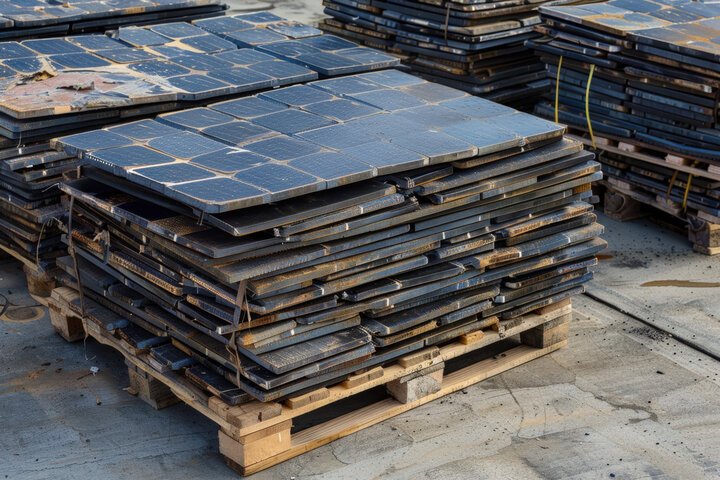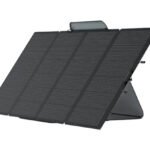Solar panel recycling is a reality that further contributes to the sustainability of photovoltaic energy. Once the panels have reached the end of their useful life, their components are recycled to give them a new use.
In the United Kingdom, the recycling of solar panels is governed by the Waste Electrical and Electronic Equipment (WEEE) Regulations 2013 (as amended). Under these regulations, photovoltaic (PV) panels are classified as electronic waste (e-waste), imposing specific responsibilities on producers, importers, and manufacturers.

How does solar panel recycling work?
As we just mentioned, solar panel recycling is not an option but a requirement. If you want to replace an old panel with another, the installer will handle the recycling. If you’re not replacing it, you can take the solar panel to a recycling centre.
Do not attempt to dismantle a solar panel yourself because of the potentially hazardous materials within. So, the process must be carried out by specialists.
The Recycling Process
Photovoltaic panels are primarily composed of glass but also include aluminium, plastic, and semiconductor metals such as silicon. On average, 95% of the components of a photovoltaic panel are recyclable and can be reused to build new solar panels.
The aluminium frame that covers the entire panel is 100% recyclable. The glass, meanwhile, is 95% recyclable.
Once these materials are removed, what remains are small amounts of plastic and other materials. These are subjected to a thermal process, and the heat causes the residual plastic components to evaporate, and the remaining materials can be reused.
The silicon that makes up the cell is the most difficult material to recycle, yet it is 85% recyclable. To give it another useful life, it undergoes various purification and smelting processes.
This is achieved through different mechanisms or systems that complement each other:
Mechanical Shredding
The first step in the solar panel recycling process is mechanical shredding. This consists of disintegrating the panels into small fragments using mechanical equipment. The pieces are then sorted according to whether they are made of glass, metal, or plastic.
The advantage of this procedure is that it is fast and relatively low-cost. The disadvantage is that it can generate secondary waste.
Thermal Separation
The crushed fragments are subjected to high temperatures in a furnace or reactor. The heat causes the evaporation of organic components such as plastics and adhesives, leaving inorganic components such as glass and metal.
The most advantageous aspect of this system is that it achieves efficient separation of materials. However, it requires a high amount of energy and is a process that can emit polluting gases if not properly controlled.
Chemical Leaching
This process is applied selectively to certain parts of solar panels. It involves immersing panel fragments in chemical solutions capable of dissolving materials such as silver, silicon, or aluminium.
The chemical solutions are then processed to precipitate and recover the dissolved materials. Undissolved materials are washed and subjected to further treatment for recovery or, failing that, are disposed of safely.
This procedure is very effective for recovering valuable metals found in solar panels at very low concentrations. However, it is a costly process and must be carried out with extreme caution because it requires hazardous chemicals.

Solar Panel Recycling Initiatives
If you’re thinking about installing solar panels in your home or business, you’ll already know that the panels’ useful lifespan is 25 or 30 years. And their usefulness is expected to extend even longer as technology advances.
In any case, there comes a time when the panels must be removed and replaced with new ones, and this can generate a large amount of waste.
The National Interdisciplinary Circular Economy Research (NICER) program says in a new report that the UK solar industry could generate 1.2 million tons of waste by 2050. So, recycling photovoltaic panels is important because it can drastically reduce this figure.
To make photovoltaic energy an even more sustainable system, various projects are already being worked on to improve recycling. In fact, in recent years, the number of companies dedicated to recycling solar panels has grown.
What are the benefits of recycling solar panels?
Installing solar panels and choosing the best rate is a good way to save money and protect the environment. But the benefits of solar energy continue even when it’s time to replace one panel with another because recycling has a positive impact:
- Optimizing resources. Recycling materials from solar panels avoids the extraction of more raw materials to make new panels. This has a positive impact on the environment.
- Less waste. If we can make the most of the components of a panel that is no longer in use, we won’t need so many landfills filled with polluting materials.
- Job creation. As solar panel recycling advances, more companies are dedicated to this work, creating jobs.
- Economic asset. Recycled materials have the potential to become a valuable asset in the market.

Where can you recycle solar panels in the UK?
Here’s a short list of some of the top solar panel recycling companies in the UK:
Recycle Solar
Scunthorpe, North Lincolnshire
The only UK-based solar panel recycling service, offering nationwide collections.
Waste Experts
Huddersfield
An Approved Authorised Treatment Facility (AATF) specializing in solar panel recycling, meeting Environment Agency targets.
Sol Recycle
Manchester
Provides solar panel recycling services, recovering up to 95% of materials for reuse.
UBH Group’s Solar Recycling Services (SRS)
Multiple locations
Offers a network of collection and processing centres throughout the UK for comprehensive solar waste recycling.
PV CYCLE UK
Sheffield
Provides a network of collection points for PV panel waste across the UK.
Did you ever imagine that recycling solar panels could be so efficient yet relatively simple to do? This is undoubtedly one more reason to switch to solar energy.




Leave a Reply